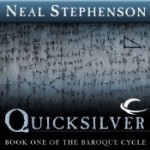
 Quicksilver
Quicksilver
By Neal Stephenson; Read by Simon Prebble and Kevin Pariseau
Audible Download – 14 Hours 48 Minutes [UNABRIDGED]
Publisher: Audible Frontiers
Published: 2010
Themes: / Natural Philosophy / History Of Science / Historical Fiction
Let me begin this review by saying that anyone with the cajones to write historical fiction on this scale deserves mad props. Quicksilver, being the introductory volume in Neal Stephenson’s epic Baroque Cycle, spins a dizzying tale of science and adventure on the colorful canvas of late seventeenth- and early eighteenth-century Christendom. Like Stephenson’s massive World War II yarn Cryptonomicon, Quicksilver blends erudite discourse on the nature of the world with high drama and hair-raising adventure. The story sometimes takes a back seat to the intellectual ideas under discussion, but readers not afraid to apply a little mental elbow grease will find a lot to enjoy.
Before diving into an actual review, a note on this audio edition is in order. Audible Frontiers has elected to split the three massive print volumes of the Baroque Cycle into eight audiobooks. They haven’t just taken a metaphorical paper knife to the series, though. They’ve worked closely with Neal Stephenson to ensure the audio volumes have their own cohesion and progression. Neal Stephenson also lends his voice to a brief audio introduction preceding each volume. Thus, this audio performance of Quicksilver comprises only part of the print volume of the same name. I’ve not read the print edition, so I can’t draw any further comparisons.
In typical non-linear Stephenson fashion, Quicksilver narrates the pivotal events in the life of Puritan-turned-scholar Daniel Waterhouse. The story jumps between his youth in the mid-1600s and his later life in the early 1700s. Readers of Cryptonomicon will be familiar with this technique. They’ll probably also recognize our protagonist’s surname, as the Waterhouse family plays a pivotal role in the aforementioned novel. The ageless enigmatic Enoch Root also makes an appearance early on in the novel. Stephenson, to some extent, seems to be following the example of James Clavell, whose Struan family formed the backbone of his Hong Kong novels through different time periods. Having said that, one certainly doesn’t need to have read Cryptonomicon to appreciate Quicksilver.
The similarities between Cryptonomicon and Quicksilver also extend to theme and writing style. Stephenson takes frequent detours to explain the dynamics of a sun dial, the optics of a telescope, or the physics of eighteenth-century seafaring vessels. The digressions feel appropriate to a tale that features the likes of Isaac Newton, Samuel Pepys, and Gottfried Leibniz. Indeed the title Quicksilver, the common name for mercury, serves as a metaphor for the transition in modes of thinking and reasoning that the novel is trying to highlight. Daniel Waterhouse witnesses the nascent days of experimental science as we know it. The erudite dialogues and monologues sometimes made my eyes glaze over, however, and I was yearning to return to the story.
What saves Quicksilver from sometimes devolving into a mere lecture on the history of science is Neal Stephenson’s vibrant prose. Stephenson writes with the exact precision of a philosopher, but with an eye for earthy metaphors and a sensitivity towards the modern reader. I might quibble with occasional use of language that wasn’t current in the seventeenth century, but must concede that these (usually very minor) transgressions make the work far easier to read and digest. As a lover of language for language’s sake, I found Quicksilver a philological joy to read.
The colorful prose is brought to life by Simon Prebble’s artful narration. Narrating historical fiction can be almost as monumental a task as writing it. How does one lend a voice to the intellectual magnificence of a Newton or a Leibniz? Simon Prebble does a magnificent job, aided by Stephenson’s written cues, of bringing real life and character to most of the novel’s characters. The cast of Quicksilver encompasses a vast ethnic background, from British to Dutch to German to the New World, and Simon Prebble juggles this diversity with ease. Kevin Pariseau narrates only the epigraphs beginning each chapter, which are usually apropos to the following content.
One last observation about Quicksilver: it isn’t really science fiction. Okay, if you want to get pedantic, it’s actually the purest form of science fiction–fiction about science and its development. But the novel certainly isn’t science fiction in the modern genre sense. The ageless (immortal?) Enoch Root figures into the tale, and there are certainly themes reminiscent of science fiction (what is real? how does the world work?), but listeners casually browsing the science fiction portion of Audible hoping for a straightforward science fiction story will be disappointed. Like so often happens in publishing, I assume that the categorization was a marketing decision, by analogy with Stephenson’s more strictly science fiction work like Snow Crash. Still, fans of science fiction with an open mind will find lots to appreciate in these stories.
I’ve begun listening to King Of The Vagabonds, the follow-up volume to Quicksilver. The story shifts gears abruptly in both focus and tone, turning its attention now to the homeless beggar and thief Jack Shaftoe (another familiar name to readers of Cryptonomicon). Clearly the Baroque Cycle has a wide array of stories to tell, and I’m looking forward to following its tangled webs.
Posted by Seth Wilson
Okay. I am very impressed. This review has made me want to listen to this audiobook RIGHT NOW!
But with plans afoot, as they are, I probably won’t be able to get to it til next year. :(